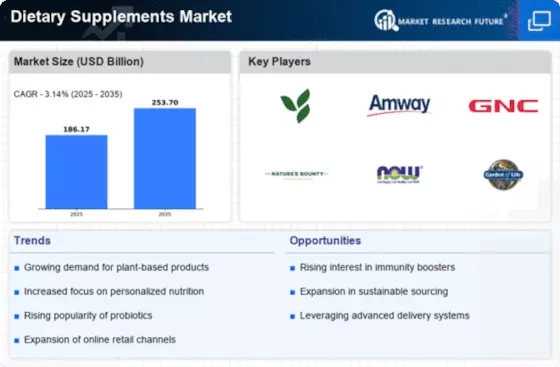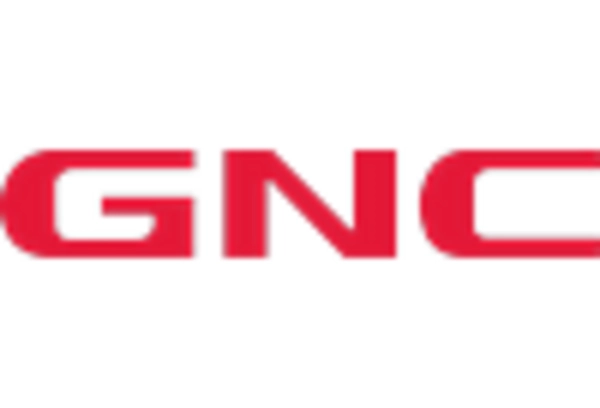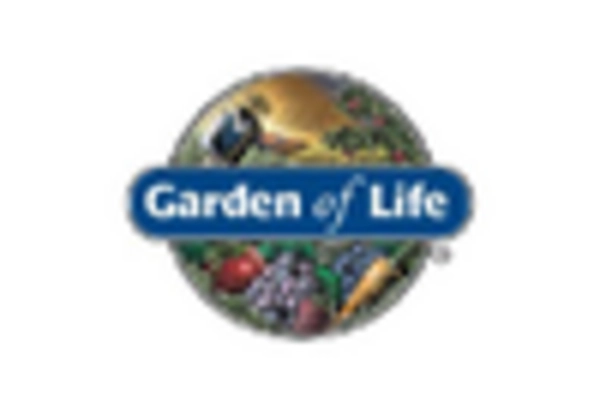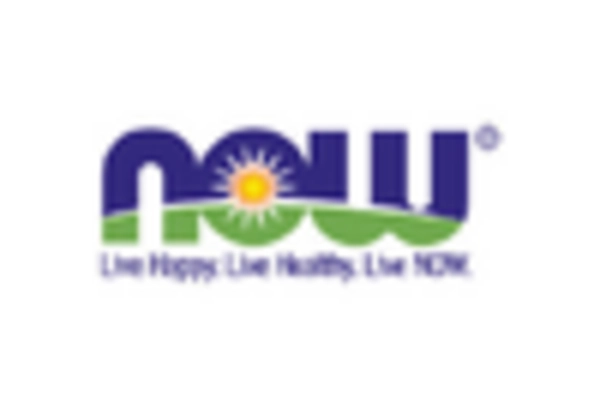Tablets
Capsules
Powders
Liquids
Soft gels
Vitamins
Minerals
Herbs
Amino Acids
Enzymes
Online
Supermarkets
Health Food Stores
Pharmacies
Direct Sales
Adults
Children
Pregnant Women
Elderly
North America
Europe
South America
Asia Pacific
Middle East and Africa
North America Outlook (USD Billion, 2019-2035)
North America Dietary Supplements Market by Form Type
Tablets
Capsules
Powders
Liquids
Soft gels
North America Dietary Supplements Market by Ingredients Type
Vitamins
Minerals
Herbs
Amino Acids
Enzymes
North America Dietary Supplements Market by Distribution Channel Type
Online
Supermarkets
Health Food Stores
Pharmacies
Direct Sales
North America Dietary Supplements Market by End User Type
Adults
Children
Pregnant Women
Elderly
North America Dietary Supplements Market by Regional Type
US
Canada
US Outlook (USD Billion, 2019-2035)
US Dietary Supplements Market by Form Type
Tablets
Capsules
Powders
Liquids
Soft gels
US Dietary Supplements Market by Ingredients Type
Vitamins
Minerals
Herbs
Amino Acids
Enzymes
US Dietary Supplements Market by Distribution Channel Type
Online
Supermarkets
Health Food Stores
Pharmacies
Direct Sales
US Dietary Supplements Market by End User Type
Adults
Children
Pregnant Women
Elderly
CANADA Outlook (USD Billion, 2019-2035)
CANADA Dietary Supplements Market by Form Type
Tablets
Capsules
Powders
Liquids
Soft gels
CANADA Dietary Supplements Market by Ingredients Type
Vitamins
Minerals
Herbs
Amino Acids
Enzymes
CANADA Dietary Supplements Market by Distribution Channel Type
Online
Supermarkets
Health Food Stores
Pharmacies
Direct Sales
CANADA Dietary Supplements Market by End User Type
Adults
Children
Pregnant Women
Elderly
Europe Outlook (USD Billion, 2019-2035)
Europe Dietary Supplements Market by Form Type
Tablets
Capsules
Powders
Liquids
Soft gels
Europe Dietary Supplements Market by Ingredients Type
Vitamins
Minerals
Herbs
Amino Acids
Enzymes
Europe Dietary Supplements Market by Distribution Channel Type
Online
Supermarkets
Health Food Stores
Pharmacies
Direct Sales
Europe Dietary Supplements Market by End User Type
Adults
Children
Pregnant Women
Elderly
Europe Dietary Supplements Market by Regional Type
Germany
UK
France
Russia
Italy
Spain
Rest of Europe
GERMANY Outlook (USD Billion, 2019-2035)
GERMANY Dietary Supplements Market by Form Type
Tablets
Capsules
Powders
Liquids
Soft gels
GERMANY Dietary Supplements Market by Ingredients Type
Vitamins
Minerals
Herbs
Amino Acids
Enzymes
GERMANY Dietary Supplements Market by Distribution Channel Type
Online
Supermarkets
Health Food Stores
Pharmacies
Direct Sales
GERMANY Dietary Supplements Market by End User Type
Adults
Children
Pregnant Women
Elderly
UK Outlook (USD Billion, 2019-2035)
UK Dietary Supplements Market by Form Type
Tablets
Capsules
Powders
Liquids
Soft gels
UK Dietary Supplements Market by Ingredients Type
Vitamins
Minerals
Herbs
Amino Acids
Enzymes
UK Dietary Supplements Market by Distribution Channel Type
Online
Supermarkets
Health Food Stores
Pharmacies
Direct Sales
UK Dietary Supplements Market by End User Type
Adults
Children
Pregnant Women
Elderly
FRANCE Outlook (USD Billion, 2019-2035)
FRANCE Dietary Supplements Market by Form Type
Tablets
Capsules
Powders
Liquids
Soft gels
FRANCE Dietary Supplements Market by Ingredients Type
Vitamins
Minerals
Herbs
Amino Acids
Enzymes
FRANCE Dietary Supplements Market by Distribution Channel Type
Online
Supermarkets
Health Food Stores
Pharmacies
Direct Sales
FRANCE Dietary Supplements Market by End User Type
Adults
Children
Pregnant Women
Elderly
RUSSIA Outlook (USD Billion, 2019-2035)
RUSSIA Dietary Supplements Market by Form Type
Tablets
Capsules
Powders
Liquids
Soft gels
RUSSIA Dietary Supplements Market by Ingredients Type
Vitamins
Minerals
Herbs
Amino Acids
Enzymes
RUSSIA Dietary Supplements Market by Distribution Channel Type
Online
Supermarkets
Health Food Stores
Pharmacies
Direct Sales
RUSSIA Dietary Supplements Market by End User Type
Adults
Children
Pregnant Women
Elderly
ITALY Outlook (USD Billion, 2019-2035)
ITALY Dietary Supplements Market by Form Type
Tablets
Capsules
Powders
Liquids
Soft gels
ITALY Dietary Supplements Market by Ingredients Type
Vitamins
Minerals
Herbs
Amino Acids
Enzymes
ITALY Dietary Supplements Market by Distribution Channel Type
Online
Supermarkets
Health Food Stores
Pharmacies
Direct Sales
ITALY Dietary Supplements Market by End User Type
Adults
Children
Pregnant Women
Elderly
SPAIN Outlook (USD Billion, 2019-2035)
SPAIN Dietary Supplements Market by Form Type
Tablets
Capsules
Powders
Liquids
Soft gels
SPAIN Dietary Supplements Market by Ingredients Type
Vitamins
Minerals
Herbs
Amino Acids
Enzymes
SPAIN Dietary Supplements Market by Distribution Channel Type
Online
Supermarkets
Health Food Stores
Pharmacies
Direct Sales
SPAIN Dietary Supplements Market by End User Type
Adults
Children
Pregnant Women
Elderly
REST OF EUROPE Outlook (USD Billion, 2019-2035)
REST OF EUROPE Dietary Supplements Market by Form Type
Tablets
Capsules
Powders
Liquids
Soft gels
REST OF EUROPE Dietary Supplements Market by Ingredients Type
Vitamins
Minerals
Herbs
Amino Acids
Enzymes
REST OF EUROPE Dietary Supplements Market by Distribution Channel Type
Online
Supermarkets
Health Food Stores
Pharmacies
Direct Sales
REST OF EUROPE Dietary Supplements Market by End User Type
Adults
Children
Pregnant Women
Elderly
APAC Outlook (USD Billion, 2019-2035)
APAC Dietary Supplements Market by Form Type
Tablets
Capsules
Powders
Liquids
Soft gels
APAC Dietary Supplements Market by Ingredients Type
Vitamins
Minerals
Herbs
Amino Acids
Enzymes
APAC Dietary Supplements Market by Distribution Channel Type
Online
Supermarkets
Health Food Stores
Pharmacies
Direct Sales
APAC Dietary Supplements Market by End User Type
Adults
Children
Pregnant Women
Elderly
APAC Dietary Supplements Market by Regional Type
China
India
Japan
South Korea
Malaysia
Thailand
Indonesia
Rest of APAC
CHINA Outlook (USD Billion, 2019-2035)
CHINA Dietary Supplements Market by Form Type
Tablets
Capsules
Powders
Liquids
Soft gels
CHINA Dietary Supplements Market by Ingredients Type
Vitamins
Minerals
Herbs
Amino Acids
Enzymes
CHINA Dietary Supplements Market by Distribution Channel Type
Online
Supermarkets
Health Food Stores
Pharmacies
Direct Sales
CHINA Dietary Supplements Market by End User Type
Adults
Children
Pregnant Women
Elderly
INDIA Outlook (USD Billion, 2019-2035)
INDIA Dietary Supplements Market by Form Type
Tablets
Capsules
Powders
Liquids
Soft gels
INDIA Dietary Supplements Market by Ingredients Type
Vitamins
Minerals
Herbs
Amino Acids
Enzymes
INDIA Dietary Supplements Market by Distribution Channel Type
Online
Supermarkets
Health Food Stores
Pharmacies
Direct Sales
INDIA Dietary Supplements Market by End User Type
Adults
Children
Pregnant Women
Elderly
JAPAN Outlook (USD Billion, 2019-2035)
JAPAN Dietary Supplements Market by Form Type
Tablets
Capsules
Powders
Liquids
Soft gels
JAPAN Dietary Supplements Market by Ingredients Type
Vitamins
Minerals
Herbs
Amino Acids
Enzymes
JAPAN Dietary Supplements Market by Distribution Channel Type
Online
Supermarkets
Health Food Stores
Pharmacies
Direct Sales
JAPAN Dietary Supplements Market by End User Type
Adults
Children
Pregnant Women
Elderly
SOUTH KOREA Outlook (USD Billion, 2019-2035)
SOUTH KOREA Dietary Supplements Market by Form Type
Tablets
Capsules
Powders
Liquids
Soft gels
SOUTH KOREA Dietary Supplements Market by Ingredients Type
Vitamins
Minerals
Herbs
Amino Acids
Enzymes
SOUTH KOREA Dietary Supplements Market by Distribution Channel Type
Online
Supermarkets
Health Food Stores
Pharmacies
Direct Sales
SOUTH KOREA Dietary Supplements Market by End User Type
Adults
Children
Pregnant Women
Elderly
MALAYSIA Outlook (USD Billion, 2019-2035)
MALAYSIA Dietary Supplements Market by Form Type
Tablets
Capsules
Powders
Liquids
Soft gels
MALAYSIA Dietary Supplements Market by Ingredients Type
Vitamins
Minerals
Herbs
Amino Acids
Enzymes
MALAYSIA Dietary Supplements Market by Distribution Channel Type
Online
Supermarkets
Health Food Stores
Pharmacies
Direct Sales
MALAYSIA Dietary Supplements Market by End User Type
Adults
Children
Pregnant Women
Elderly
THAILAND Outlook (USD Billion, 2019-2035)
THAILAND Dietary Supplements Market by Form Type
Tablets
Capsules
Powders
Liquids
Soft gels
THAILAND Dietary Supplements Market by Ingredients Type
Vitamins
Minerals
Herbs
Amino Acids
Enzymes
THAILAND Dietary Supplements Market by Distribution Channel Type
Online
Supermarkets
Health Food Stores
Pharmacies
Direct Sales
THAILAND Dietary Supplements Market by End User Type
Adults
Children
Pregnant Women
Elderly
INDONESIA Outlook (USD Billion, 2019-2035)
INDONESIA Dietary Supplements Market by Form Type
Tablets
Capsules
Powders
Liquids
Soft gels
INDONESIA Dietary Supplements Market by Ingredients Type
Vitamins
Minerals
Herbs
Amino Acids
Enzymes
INDONESIA Dietary Supplements Market by Distribution Channel Type
Online
Supermarkets
Health Food Stores
Pharmacies
Direct Sales
INDONESIA Dietary Supplements Market by End User Type
Adults
Children
Pregnant Women
Elderly
REST OF APAC Outlook (USD Billion, 2019-2035)
REST OF APAC Dietary Supplements Market by Form Type
Tablets
Capsules
Powders
Liquids
Soft gels
REST OF APAC Dietary Supplements Market by Ingredients Type
Vitamins
Minerals
Herbs
Amino Acids
Enzymes
REST OF APAC Dietary Supplements Market by Distribution Channel Type
Online
Supermarkets
Health Food Stores
Pharmacies
Direct Sales
REST OF APAC Dietary Supplements Market by End User Type
Adults
Children
Pregnant Women
Elderly
South America Outlook (USD Billion, 2019-2035)
South America Dietary Supplements Market by Form Type
Tablets
Capsules
Powders
Liquids
Soft gels
South America Dietary Supplements Market by Ingredients Type
Vitamins
Minerals
Herbs
Amino Acids
Enzymes
South America Dietary Supplements Market by Distribution Channel Type
Online
Supermarkets
Health Food Stores
Pharmacies
Direct Sales
South America Dietary Supplements Market by End User Type
Adults
Children
Pregnant Women
Elderly
South America Dietary Supplements Market by Regional Type
Brazil
Mexico
Argentina
Rest of South America
BRAZIL Outlook (USD Billion, 2019-2035)
BRAZIL Dietary Supplements Market by Form Type
Tablets
Capsules
Powders
Liquids
Soft gels
BRAZIL Dietary Supplements Market by Ingredients Type
Vitamins
Minerals
Herbs
Amino Acids
Enzymes
BRAZIL Dietary Supplements Market by Distribution Channel Type
Online
Supermarkets
Health Food Stores
Pharmacies
Direct Sales
BRAZIL Dietary Supplements Market by End User Type
Adults
Children
Pregnant Women
Elderly
MEXICO Outlook (USD Billion, 2019-2035)
MEXICO Dietary Supplements Market by Form Type
Tablets
Capsules
Powders
Liquids
Soft gels
MEXICO Dietary Supplements Market by Ingredients Type
Vitamins
Minerals
Herbs
Amino Acids
Enzymes
MEXICO Dietary Supplements Market by Distribution Channel Type
Online
Supermarkets
Health Food Stores
Pharmacies
Direct Sales
MEXICO Dietary Supplements Market by End User Type
Adults
Children
Pregnant Women
Elderly
ARGENTINA Outlook (USD Billion, 2019-2035)
ARGENTINA Dietary Supplements Market by Form Type
Tablets
Capsules
Powders
Liquids
Soft gels
ARGENTINA Dietary Supplements Market by Ingredients Type
Vitamins
Minerals
Herbs
Amino Acids
Enzymes
ARGENTINA Dietary Supplements Market by Distribution Channel Type
Online
Supermarkets
Health Food Stores
Pharmacies
Direct Sales
ARGENTINA Dietary Supplements Market by End User Type
Adults
Children
Pregnant Women
Elderly
REST OF SOUTH AMERICA Outlook (USD Billion, 2019-2035)
REST OF SOUTH AMERICA Dietary Supplements Market by Form Type
Tablets
Capsules
Powders
Liquids
Soft gels
REST OF SOUTH AMERICA Dietary Supplements Market by Ingredients Type
Vitamins
Minerals
Herbs
Amino Acids
Enzymes
REST OF SOUTH AMERICA Dietary Supplements Market by Distribution Channel Type
Online
Supermarkets
Health Food Stores
Pharmacies
Direct Sales
REST OF SOUTH AMERICA Dietary Supplements Market by End User Type
Adults
Children
Pregnant Women
Elderly
MEA Outlook (USD Billion, 2019-2035)
MEA Dietary Supplements Market by Form Type
Tablets
Capsules
Powders
Liquids
Soft gels
MEA Dietary Supplements Market by Ingredients Type
Vitamins
Minerals
Herbs
Amino Acids
Enzymes
MEA Dietary Supplements Market by Distribution Channel Type
Online
Supermarkets
Health Food Stores
Pharmacies
Direct Sales
MEA Dietary Supplements Market by End User Type
Adults
Children
Pregnant Women
Elderly
MEA Dietary Supplements Market by Regional Type
GCC Countries
South Africa
Rest of MEA
GCC COUNTRIES Outlook (USD Billion, 2019-2035)
GCC COUNTRIES Dietary Supplements Market by Form Type
Tablets
Capsules
Powders
Liquids
Soft gels
GCC COUNTRIES Dietary Supplements Market by Ingredients Type
Vitamins
Minerals
Herbs
Amino Acids
Enzymes
GCC COUNTRIES Dietary Supplements Market by Distribution Channel Type
Online
Supermarkets
Health Food Stores
Pharmacies
Direct Sales
GCC COUNTRIES Dietary Supplements Market by End User Type
Adults
Children
Pregnant Women
Elderly
SOUTH AFRICA Outlook (USD Billion, 2019-2035)
SOUTH AFRICA Dietary Supplements Market by Form Type
Tablets
Capsules
Powders
Liquids
Soft gels
SOUTH AFRICA Dietary Supplements Market by Ingredients Type
Vitamins
Minerals
Herbs
Amino Acids
Enzymes
SOUTH AFRICA Dietary Supplements Market by Distribution Channel Type
Online
Supermarkets
Health Food Stores
Pharmacies
Direct Sales
SOUTH AFRICA Dietary Supplements Market by End User Type
Adults
Children
Pregnant Women
Elderly
REST OF MEA Outlook (USD Billion, 2019-2035)
REST OF MEA Dietary Supplements Market by Form Type
Tablets
Capsules
Powders
Liquids
Soft gels
REST OF MEA Dietary Supplements Market by Ingredients Type
Vitamins
Minerals
Herbs
Amino Acids
Enzymes
REST OF MEA Dietary Supplements Market by Distribution Channel Type
Online
Supermarkets
Health Food Stores
Pharmacies
Direct Sales
REST OF MEA Dietary Supplements Market by End User Type
Adults
Children
Pregnant Women
Elderly


















Leave a Comment